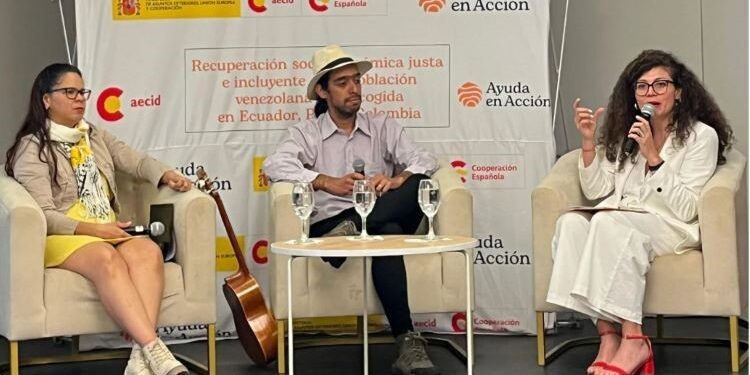The Diplomat
The Spanish Agency for International Development Cooperation (AECID) and the NGO Ayuda en Acción have launched a project to facilitate the socioeconomic and cultural integration of Venezuelan migrants or refugees and to help host populations in Colombia, Ecuador and Peru.
The Fair and Inclusive Socioeconomic Recovery of the Venezuelan and Host Population project is financed with three million euros by the AECID) and implemented by Ayuda en Acción with the collaboration of local partners WWB Foundation, Banco Codesarrollo and Perspektiva, and has a duration of four years.
As reported yesterday by Ayuda en Acción in a press release, the project is based on the logic of the Triple Nexus, focusing on three main axes: economic integration, social protection and cohesion, and a culture of peace. The target group is made up of people from 18 to 55 years of age of Venezuelan nationality in a situation of human mobility, located in Colombia, Ecuador and Peru, and people from 20 to 55 years of age from the host communities, who may have negative perceptions about the contribution of Venezuelan migrants or refugees to their community and face similar problems.
The intervention of the Convention includes both the Venezuelan migrant or refugee population and the vulnerable host population. It is expected to reach 7,240 people, of which 70% correspond to Venezuelan immigrants or refugees and 30% to reception. By having a solid focus on gender, it is expected that the Agreement will reach 65% of the total beneficiaries being women.
The economic and social collapse of Venezuela has left millions of Venezuelans with problems meeting their basic needs, which has resulted in the largest migration crisis in the Latin American region. Colombia, Ecuador and Peru host the largest number of Venezuelan migrants and refugees in the region, who not only seek means to survive, but also integrate into host societies.
The main needs of Venezuelan migrants and refugees at the regional level are access to documentation and regularization, income generation, access to information and guidance, mitigation of discrimination and access to social programs with different needs and assistance. humanitarian.
There are differences in the forms of settlement in the three countries that have effects on the migratory dynamics of the migrant population and the impact on the local population. While in Peru, Venezuelan migration is concentrated 90% in the city of Lima, in Ecuador it is distributed practically throughout the territory (2020) and in Colombia there is a high concentration in Bogotá, Barranquilla, Medellín and in border cities such as Cúcuta or Guajira. However, even though the context is different in each host country, the needs of the Venezuelan population are the same.







